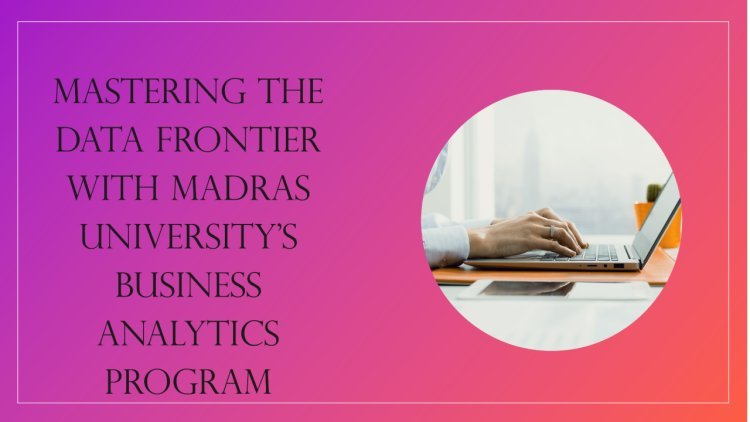Mastering the Data Frontier With Madras University's Business Analytics Program
Mastering the Data Frontier With Madras University's Business Analytics Program

In today's world, data is everywhere. From the emails we send to the purchases we make, every action creates data. For businesses, this data is like gold. It can help them understand their customers, improve their products, and make better decisions. This is where business analytics comes in. Business analytics is the process of using data to make informed business decisions. Let's explore why business analytics is so important, look at a few real-world examples, discuss the role of educational institutions like Madras University in promoting this field, and delve into future trends.
- Flipkart: Enhancing Customer Experience
Flipkart, one of India's leading e-commerce platforms, uses business analytics to enhance customer experience and streamline operations. By analyzing customer browsing and purchasing behavior, Flipkart can recommend products that are likely to interest individual users. This personalized shopping experience keeps customers engaged and increases sales.
- HDFC Bank: Improving Customer Services
HDFC Bank, one of India's largest private banks, leverages business analytics to improve its customer services. By analyzing transaction data, HDFC Bank can offer personalized banking products to its customers. For instance, customers with high transaction volumes might be offered premium banking services.
How Businesses Leverage Analytics for Decision-Making
Business analytics helps companies make better decisions in several ways:
- Understanding Customer Behavior: By analyzing data on customer behavior, businesses can gain insights into what their customers want. This information can help them develop new products or improve existing ones.
- Improving Operational Efficiency: Analytics can help businesses streamline their operations. For example, a logistics company can use data to optimize delivery routes, reducing fuel costs and improving delivery times.
- Enhancing Marketing Strategies: Businesses use analytics to make their marketing efforts more effective. By analyzing data on past marketing campaigns, companies can see which strategies worked and which didn't. They can then use this information to plan future campaigns.
- Making Informed Financial Decisions: Financial analytics can help businesses manage their finances more effectively. By analyzing financial data, companies can identify trends and make predictions about future performance, which can help them make better decisions about investments, budgeting, and cost management.
The Role of Madras University in Business Analytics
Madras University, a premier educational institution in India, plays a significant role in shaping the future of business analytics. The university's specialization in business analytics equips students with the skills and knowledge required to thrive in this data-driven world with its comprehensive curriculum, which covers a wide range of topics, including data mining, predictive analysis, and machine learning. This curriculum ensures that the students are well versed in the latest tools and techniques used in the industry. With the help of industry collaboration, where students are given first-hand experience, and their expert faculty members, they make sure that students are well versed in the latest tools and technologies of the industry.
Future Trends in Business Analytics
The field of business analytics is constantly evolving. Here are some trends that are likely to shape the future:
- Artificial intelligence and machine learning are increasingly important in business analytics. These technologies can analyze large amounts of data quickly and accurately, making it easier for businesses to gain insights. For example, AI can predict customer behavior, detect fraud, and optimize supply chains.
- Real-Time Analytics: In the future, more businesses will use real-time analytics to make decisions on the fly. This involves analyzing data as it is generated rather than waiting until later. For example, an online retailer might use real-time analytics to adjust prices based on current demand.
- Data Privacy and Security: As businesses collect more data, concerns about data privacy and security are growing. In the future, companies must find ways to protect their data and comply with regulations. This will involve investing in security measures and being transparent with customers about their data use.
Conclusion
Business analytics is a powerful tool that can help companies make better decisions, understand their customers, and improve their operations. By leveraging data, businesses can gain valuable insights and stay competitive in today's data-driven world. Educational institutions like Madras University are crucial in preparing the next generation of business analysts, ensuring they have the skills to navigate this complex field. As technology continues to evolve, business analytics will only grow, making it essential for businesses and educational institutions to stay ahead of the curve and embrace these trends.
What's Your Reaction?










![Wireless Connectivity Software Market Size, Share | Statistics [2032]](https://handyclassified.com/uploads/images/202404/image_100x75_661f3be896033.jpg)




